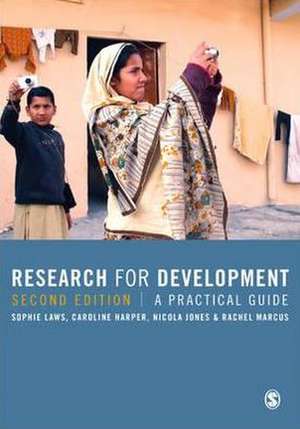Research for Development: A Practical Guide
Autor Sophie Laws, Caroline Harper, Nicola Jones, Rachel Marcusen Limba Engleză Paperback – 7 feb 2013
- the uses, planning and management of research
- reviewing existing evidence
- learning development research skills
- choosing research methods
- undertaking ethical research
- writing an effective research report
- promoting research uptake and assessing research
- monitoring and evaluation
This fully revised second edition also includes a new section on how to use the internet for research. Its 16 chapters are enriched by a variety of international case studies, checklists of key points, learning exercises, helpful references to further reading and engaging illustrations. The book also includes a detailed glossary of terms.
Drawing on considerable hands-on experience, Research for Development is an ideal practical companion for students of development studies and public policy, as well as practitioners in the field.
Cover image © Jenny Matthews / World Vision/ PhotoVoice
| Toate formatele și edițiile | Preț | Express |
|---|---|---|
| Paperback (1) | 396.98 lei 3-5 săpt. | +38.33 lei 10-14 zile |
| SAGE Publications – 7 feb 2013 | 396.98 lei 3-5 săpt. | +38.33 lei 10-14 zile |
| Hardback (1) | 1127.04 lei 6-8 săpt. | |
| SAGE Publications – 7 feb 2013 | 1127.04 lei 6-8 săpt. |
Preț: 396.98 lei
Nou
Puncte Express: 595
Preț estimativ în valută:
75.96€ • 79.52$ • 62.85£
75.96€ • 79.52$ • 62.85£
Carte disponibilă
Livrare economică 15-29 martie
Livrare express 04-08 martie pentru 48.32 lei
Preluare comenzi: 021 569.72.76
Specificații
ISBN-13: 9781446252376
ISBN-10: 144625237X
Pagini: 440
Ilustrații: illustrations
Dimensiuni: 170 x 242 x 26 mm
Greutate: 0.75 kg
Ediția:Second Edition
Editura: SAGE Publications
Colecția Sage Publications Ltd
Locul publicării:London, United Kingdom
ISBN-10: 144625237X
Pagini: 440
Ilustrații: illustrations
Dimensiuni: 170 x 242 x 26 mm
Greutate: 0.75 kg
Ediția:Second Edition
Editura: SAGE Publications
Colecția Sage Publications Ltd
Locul publicării:London, United Kingdom
Recenzii
In the decade since it was first published, Research for Development has become the 'go to' text for development practitioners, students and researchers alike. This substantially revised second edition is even better: brought fully up to date with many new topics and chapters, this book is comprehensive, authoritative and highly informative. Whether one is seeking a quick definition or brief explanation of a subject, or needing a more detailed guide to how to go about doing research for development, this book is quite simply indispensible.
David Lewis
Professor of Social Policy and Development, London School of Economics & Political Science
Research for Development is undoubtedly the best guide to its subject that we have. The first edition has become an indispensable work of reference for development researchers and practitioners engaged in commissioning and managing research. Oxfam staff around the world have benefitted from its use, and all of us are looking forward to the publication of the new edition. Sophie Laws, Caroline Harper, Nicola Jones and Rachel Marcus are to be congratulated for the work they have put into updating the text and keeping it relevant to the ever-changing demands of development research, and for their contribution to our common goal of making the world a better place..
Duncan Green
Senior Strategic Adviser, Oxfam
Drawing from their wide experience, the authors showcase examples from various fields including poverty studies, child trafficking, environmental issues, health and sanitation, and gender studies. This ensures that the book appeals to a wide range of development researchers and practitioners.[...] The clear, engaging written style is suited both to readers looking for an overview of certain research approaches, as well as those with more time who can engage with the exercises in each chapter. The chapters are punctuated with real-life examples and case studies that will help a novice development researcher envision what their own research may look like in the field.
David Lewis
Professor of Social Policy and Development, London School of Economics & Political Science
Research for Development is undoubtedly the best guide to its subject that we have. The first edition has become an indispensable work of reference for development researchers and practitioners engaged in commissioning and managing research. Oxfam staff around the world have benefitted from its use, and all of us are looking forward to the publication of the new edition. Sophie Laws, Caroline Harper, Nicola Jones and Rachel Marcus are to be congratulated for the work they have put into updating the text and keeping it relevant to the ever-changing demands of development research, and for their contribution to our common goal of making the world a better place..
Duncan Green
Senior Strategic Adviser, Oxfam
Drawing from their wide experience, the authors showcase examples from various fields including poverty studies, child trafficking, environmental issues, health and sanitation, and gender studies. This ensures that the book appeals to a wide range of development researchers and practitioners.[...] The clear, engaging written style is suited both to readers looking for an overview of certain research approaches, as well as those with more time who can engage with the exercises in each chapter. The chapters are punctuated with real-life examples and case studies that will help a novice development researcher envision what their own research may look like in the field.
Cuprins
How to use this book
PART ONE: INTRODUCTION AND PLANNING YOUR RESEARCH
Introduction: Why Research for Development Matters
So What Is Research?
'But I'm not a Researcher': The Contribution of the Development Worker
Who Should Do Research for Development Work? The Broader Issues
Research and Social Change
How to Tell When Research is the Best Approach to a Problem
Using Research in Development Work
So What is the Right Approach to Research for Development Work?
Two Major Research Approaches
Types of Research in Development Work
Programme-Focused and Issue-Focused Research
Using Research for Programme Development
Using Research to Influence Policy
Planning for Effective Research
Quality in Research
Choosing a Research Focus
Defining the Research Questions
Writing a Research Brief
Managing Research
Attracting and Engaging with Funders
Deciding Who Should Do The Research
Selecting and Appointing External Researchers
Managing Costs and Time
Supervising Researchers
Reviewing Existing Evidence
How to Look
Where to Look
How to Use the Internet for Research
Learning Development Research Skills
Where to Start?
Some Ways of Learning Research Skills
Supporting Southern Researchers
PART TWO: COLLECTING DATA
Choosing Methods
Choosing a Research Approach
Choosing Research Techniques
Triangulation: Using More Than One Technique
Collecting and Managing Quality Data
Introduction
Three Characterisics of Good-quality Data
Ways to Improve Quality in Data Collection
Improving Communication with Respondents
Collecting, Recording and Managing Data
Ensuring 'Trustworthiness'
Thinking about Ethics in Research
Codes of Ethics
Responsibilities Towards Respondents: Some Ethical Issues to Consider
Wider Accountability
Responsibilities to Colleagues
Choosing a Sample
What Does Sampling Mean?
Quantitative or Qualitative Sampling?
Probability or Random Sampling
Purposive or Non-Random Sampling
How to Sample For Cases, Location, Time and Events
Including 'Hard-To-Reach' People
Incentives: What Are The Issues?
Collecting Data
How to Ask Questions
Interviews
Focus Groups
Questionnaires
Use of Documentary Sources and Secondary Data Analysis
Observation
Participatory Research
Participation for...?
Participation by...?
Participation in...?
Some Participatory Research Methods
Practical Challenges in Participatory Research
Critical Perspectives on Participatory Research
PART THREE: ANALYSIS AND RESEARCH COMMUNICATION
Undertaking Research Analysis
Getting Organized
What is Analysis?
Interpretation
The Process of Data Analysis
Participation in the Analysis Process
Methods of Analysis
Qualitative Analysis
Quantitative Analysis
So What Does It All Mean?
Writing Effectively
What to Write
What Not to Write
What Must Be Included
How to Write: The Process
Writing Press Releases, Policy Briefs or Journal Articles
Promoting Research Uptake
Building a Successful Communications Strategy
Promotion for Implementation: Influencing Programmes
Promotion for Policy Influence
Some Tools for Communication
Dealing with the Media
Capacity Building
Assessing Research for Development Work
What, Who and When?
Assessing Research Output
Assessing Research Uptake
Assessing Research Impact
Appendix 1: On Monitoring and Evaluation
Appendix 2: Useful Websites
Glossary
References
PART ONE: INTRODUCTION AND PLANNING YOUR RESEARCH
Introduction: Why Research for Development Matters
So What Is Research?
'But I'm not a Researcher': The Contribution of the Development Worker
Who Should Do Research for Development Work? The Broader Issues
Research and Social Change
How to Tell When Research is the Best Approach to a Problem
Using Research in Development Work
So What is the Right Approach to Research for Development Work?
Two Major Research Approaches
Types of Research in Development Work
Programme-Focused and Issue-Focused Research
Using Research for Programme Development
Using Research to Influence Policy
Planning for Effective Research
Quality in Research
Choosing a Research Focus
Defining the Research Questions
Writing a Research Brief
Managing Research
Attracting and Engaging with Funders
Deciding Who Should Do The Research
Selecting and Appointing External Researchers
Managing Costs and Time
Supervising Researchers
Reviewing Existing Evidence
How to Look
Where to Look
How to Use the Internet for Research
Learning Development Research Skills
Where to Start?
Some Ways of Learning Research Skills
Supporting Southern Researchers
PART TWO: COLLECTING DATA
Choosing Methods
Choosing a Research Approach
Choosing Research Techniques
Triangulation: Using More Than One Technique
Collecting and Managing Quality Data
Introduction
Three Characterisics of Good-quality Data
Ways to Improve Quality in Data Collection
Improving Communication with Respondents
Collecting, Recording and Managing Data
Ensuring 'Trustworthiness'
Thinking about Ethics in Research
Codes of Ethics
Responsibilities Towards Respondents: Some Ethical Issues to Consider
Wider Accountability
Responsibilities to Colleagues
Choosing a Sample
What Does Sampling Mean?
Quantitative or Qualitative Sampling?
Probability or Random Sampling
Purposive or Non-Random Sampling
How to Sample For Cases, Location, Time and Events
Including 'Hard-To-Reach' People
Incentives: What Are The Issues?
Collecting Data
How to Ask Questions
Interviews
Focus Groups
Questionnaires
Use of Documentary Sources and Secondary Data Analysis
Observation
Participatory Research
Participation for...?
Participation by...?
Participation in...?
Some Participatory Research Methods
Practical Challenges in Participatory Research
Critical Perspectives on Participatory Research
PART THREE: ANALYSIS AND RESEARCH COMMUNICATION
Undertaking Research Analysis
Getting Organized
What is Analysis?
Interpretation
The Process of Data Analysis
Participation in the Analysis Process
Methods of Analysis
Qualitative Analysis
Quantitative Analysis
So What Does It All Mean?
Writing Effectively
What to Write
What Not to Write
What Must Be Included
How to Write: The Process
Writing Press Releases, Policy Briefs or Journal Articles
Promoting Research Uptake
Building a Successful Communications Strategy
Promotion for Implementation: Influencing Programmes
Promotion for Policy Influence
Some Tools for Communication
Dealing with the Media
Capacity Building
Assessing Research for Development Work
What, Who and When?
Assessing Research Output
Assessing Research Uptake
Assessing Research Impact
Appendix 1: On Monitoring and Evaluation
Appendix 2: Useful Websites
Glossary
References
Notă biografică
Descriere
'Research for Development has become the 'go to' text for development practitioners, students and researchers alike. This substantially revised second edition is even better: brought fully up to date with many new topics and chapters, this book is comprehensive, authoritative and highly informative' - David Lewis, Professor of Social Policy and Development, London School of Economics & Political Science








